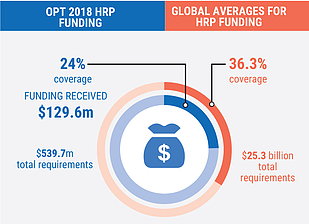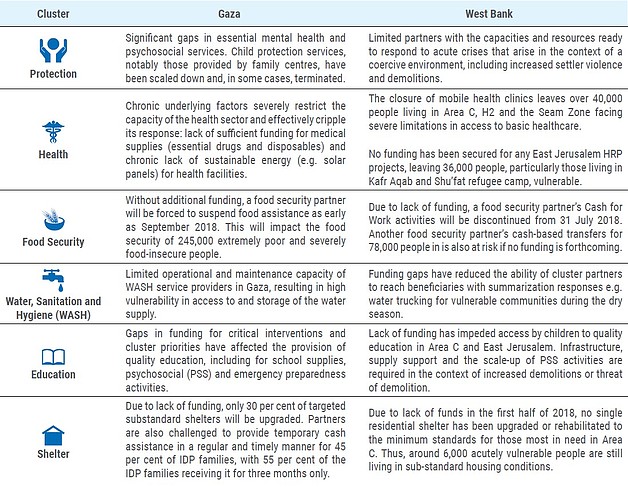Critical funding shortages threaten all humanitarian responses in the oPt
Funding for humanitarian activities is at an all-time low this year for the occupied Palestinian territory (OPT). At the end of July, the 2018 Humanitarian Response Plan (HRP) requirements were only 24 per cent funded; this is a significantly lower level of funding compared with the same period over the past eight years. Humanitarian financing to the OPT has typically fluctuated in response to significant shifts in the context, with notable peaks in financial contributions in response to active hostilities in Gaza. Following the last escalation of hostilities in 2014, humanitarian financing to the OPT has been gradually, but definitively, decreasing year on year.
Currently, $132 million have been secured for the HRP of a requested $539.7 million. To date, donors’ generous contributions to the OPT Humanitarian Fund (OPT HF) have also increased the HF total budget for this year to $19.9 million, of which $12.4 million have already been allocated and disbursed to humanitarian partners. Despite these contributions, much more is needed to enable an effective humanitarian operation. Funding is decreasing although the number of people in need and targeted for humanitarian assistance in OPT remains fairly constant, and has even increased over the past year.
While global funding for the HRP is low for this time of year, humanitarian funding for the OPT is significantly lower than the global average, currently at 36 per cent.[1]
 The decline in funding this year for UNRWA, the single largest humanitarian actor in the OPT, has undoubtedly contributed significantly to the overall drop in humanitarian funding for the OPT in 2018. On 23 July, a statement by the Agency noted that the $446 million funding deficit in all five areas of operation had been “reduced to $217 million – a monumental achievement”. Despite this, UNRWA remains in deep crisis with the imminent discontinuation of the Cash for Work and Community Mental Health programmes in the West Bank, and a halt to mobile health clinics in the West Bank effective 31 October 2018. In Gaza, changes will have to be introduced to activities such as mental health, job creation and protection services to enable retention of the emergency food programme to nearly one million refugees and interventions such as Cash for Work.
The decline in funding this year for UNRWA, the single largest humanitarian actor in the OPT, has undoubtedly contributed significantly to the overall drop in humanitarian funding for the OPT in 2018. On 23 July, a statement by the Agency noted that the $446 million funding deficit in all five areas of operation had been “reduced to $217 million – a monumental achievement”. Despite this, UNRWA remains in deep crisis with the imminent discontinuation of the Cash for Work and Community Mental Health programmes in the West Bank, and a halt to mobile health clinics in the West Bank effective 31 October 2018. In Gaza, changes will have to be introduced to activities such as mental health, job creation and protection services to enable retention of the emergency food programme to nearly one million refugees and interventions such as Cash for Work.

In parallel to the unprecedented financial crisis faced by UNRWA, nearly all agencies in the HRP have received less funding in 2018 than in previous years.
The funding that has been secured has been a critical lifeline in response to the deteriorating conditions in the OPT during the first half of the year, particularly in Gaza. However, humanitarian partners continue to struggle to respond to needs because insufficient funding limits their operational capacities and ability to deliver services.
The impact of underfunding is being felt across the board for all clusters, with concrete examples of the impact in Gaza and the West Bank provided below.
Impact of underfunding by cluster

[1] Figures are based on the data recorded on the Financial Tracking Service (FTS), as on 20 July 2018.










